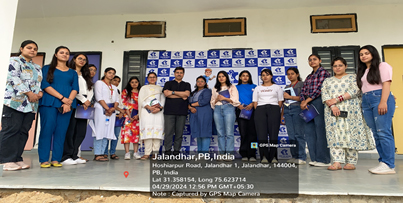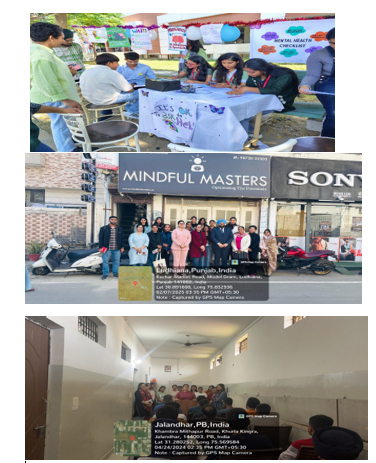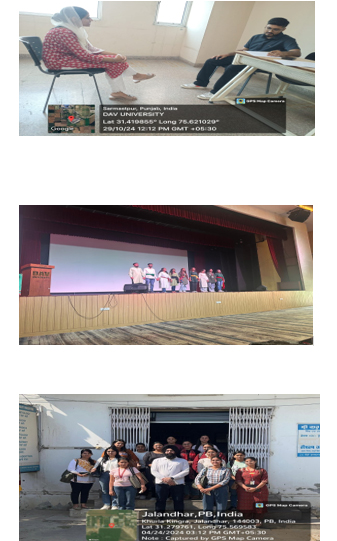Teaching pedagogy is the art and science of teaching, combining theory and practice to guide how educators deliver content, engage students, and assess learning. It has evolved from traditional methods like lectures, rote memorization, and demonstration to modern approaches such as inquiry-based learning, project-based learning, flipped classrooms, constructivist teaching, inclusive teaching and learning practices, industry-relevant curriculum, diverse learning resources, research internships, industry exposure, and career-oriented education.
The educators at the Department of Psychology prioritize inclusive education by using differentiated instruction and adaptive teaching to support the diverse learning needs of students. Educators act as facilitators and mentors, encouraging exploration, curiosity, and lifelong learning. We use a balanced approach, blending traditional structure with contemporary methods. Teaching pedagogies like Activity Based learning, Information and Communication Technology (ICT), Learning Management System (LMS), and Experiential Learning are actively used by the department to enhance student engagement and learning outcomes. The following is the description of teaching activities utilized by the department:
1. Activity Based Learning (ABL)
Activity-based learning (ABL) is a teaching methodology where students engage in various activities to actively participate in the learning process. It shifts the focus from passive listening to active participation, hands-on experiences, a learner-centered approach, independent learning, critical thinking, problem solving, creativity, innovation, real-world applications, deeper understanding, and engagement. In the department of Psychology teachers act as facilitators, guiding students through activities that encourage exploration, experimentation, and independent learning. ABL enhances engagement in the learning process, increases motivation, promotes teamwork, enhances presentation skills, communication skills, develops the problem identification and problem-solving abilities of students.
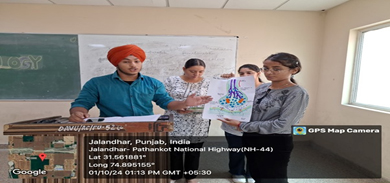
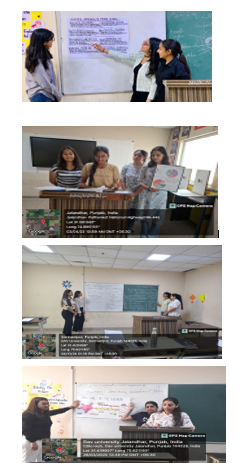
2. Information and Communication Technology (ICT)
Information and Communication Technology (ICT) plays a crucial role in contemporary teaching and learning. The Department of Psychology employs ICT tools like interactive whiteboards, multimedia content, and virtual reality to enhance learning by making it more dynamic, visually engaging, and accessible to diverse learning styles. Interactive whiteboards allow for real-time interaction with content, while multimedia content can cater to auditory and visual learners. Moreover, video conferencing and online platforms facilitate remote and hybrid learning models, providing flexibility and accessibility for learners. ICT enables personalized learning pathways and allows for targeted interventions based on individual student needs and performance.
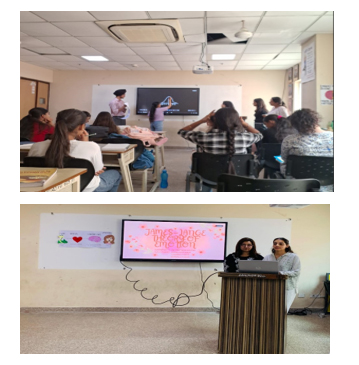
3. Learning Management System (LMS)
Learning Management System (LMS) offers platforms for the students to assess course materials, assignments, quizzes, communication, collaboration, data-driven insights, personalized learning experiences, accessibility of information, and discussion forums, streamlining the learning process. LMS collects data on student engagement and performance, allowing educators to identify struggling students, adjust teaching methods, and offer targeted support. It streamlines assignment submission, feedback, and grading, while also fostering communication through discussion forums and announcements. LMS offers personalized learning pathways, allowing students to progress at their own pace and focus on areas where they need the most support. It can make learning more accessible to students with disabilities. The educators at the Department of Psychology actively engage with students to create a dynamic and supportive online learning environment on the LMS.
4. Experiential Learning
Experiential learning is a core component of the teaching pedagogy in the Psychology Department. This approach emphasizes active, hands-on learning experiences that go beyond theoretical instruction. Through reflection, application, and experimentation, students engage in meaningful learning processes that prepare them for professional practice and advanced research. Educational Visits, Internships, Seminars, Workshops, and Short Term Training Courses organised by the Department of Psychology provide valuable insights to the students, bridging the gap between theory and practice while enhancing their skill development, emphasizing direct engagement and practical involvement. Students in the department of Psychology learn by actively participating in real-world situations. These events and activities organized by the department also provide platforms for students to interact with experts and foster their academic and professional growth.
A core feature of experiential learning is active participation, where students engage in activities like group discussions, role-plays, case analyses, and research projects to enhance their understanding and critical thinking skills. Reflection as a part of experiential learning plays a vital role, encouraging students to analyze their experiences and connect theory with practice. The application of knowledge is emphasized through hands-on opportunities such as research, counseling simulations, and community engagement, allowing students to bridge academic learning with real-world practice.
